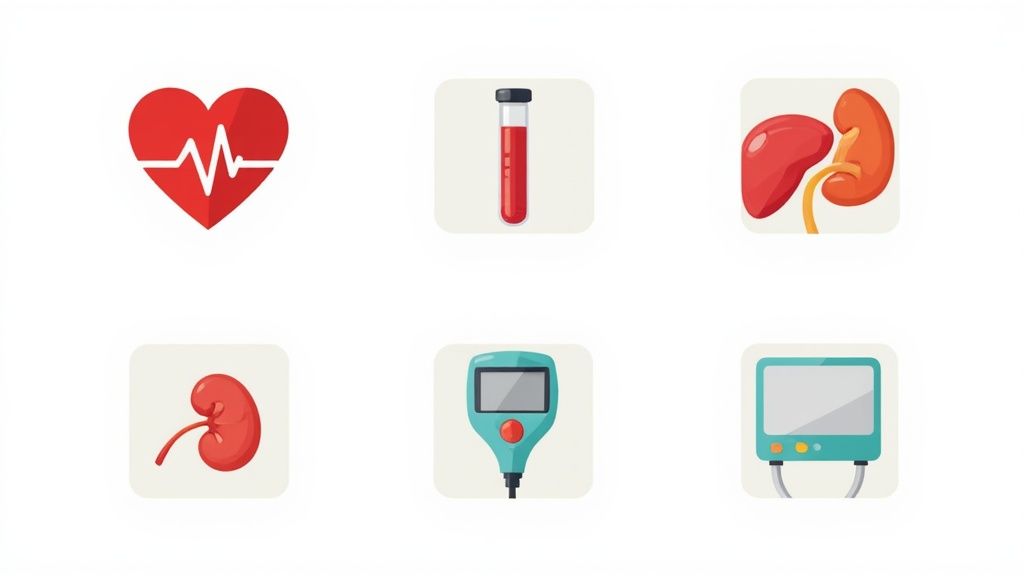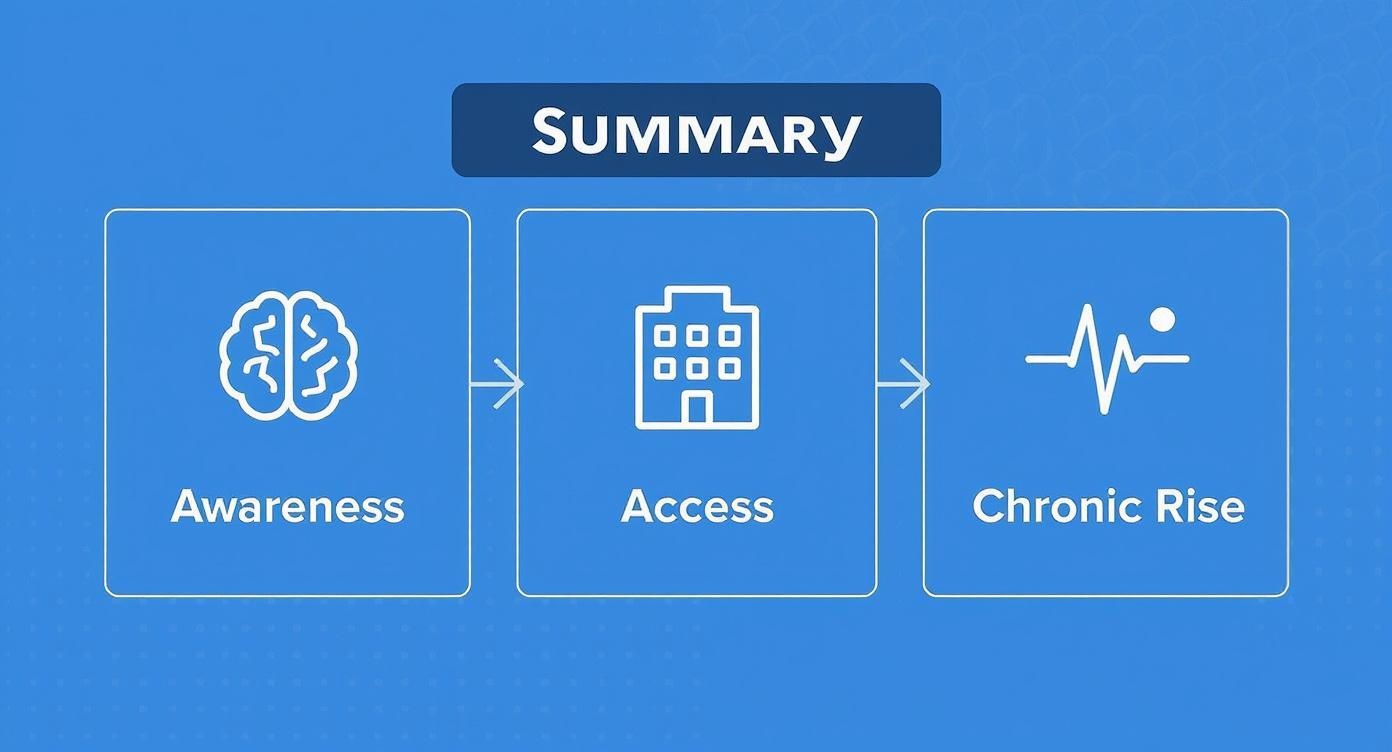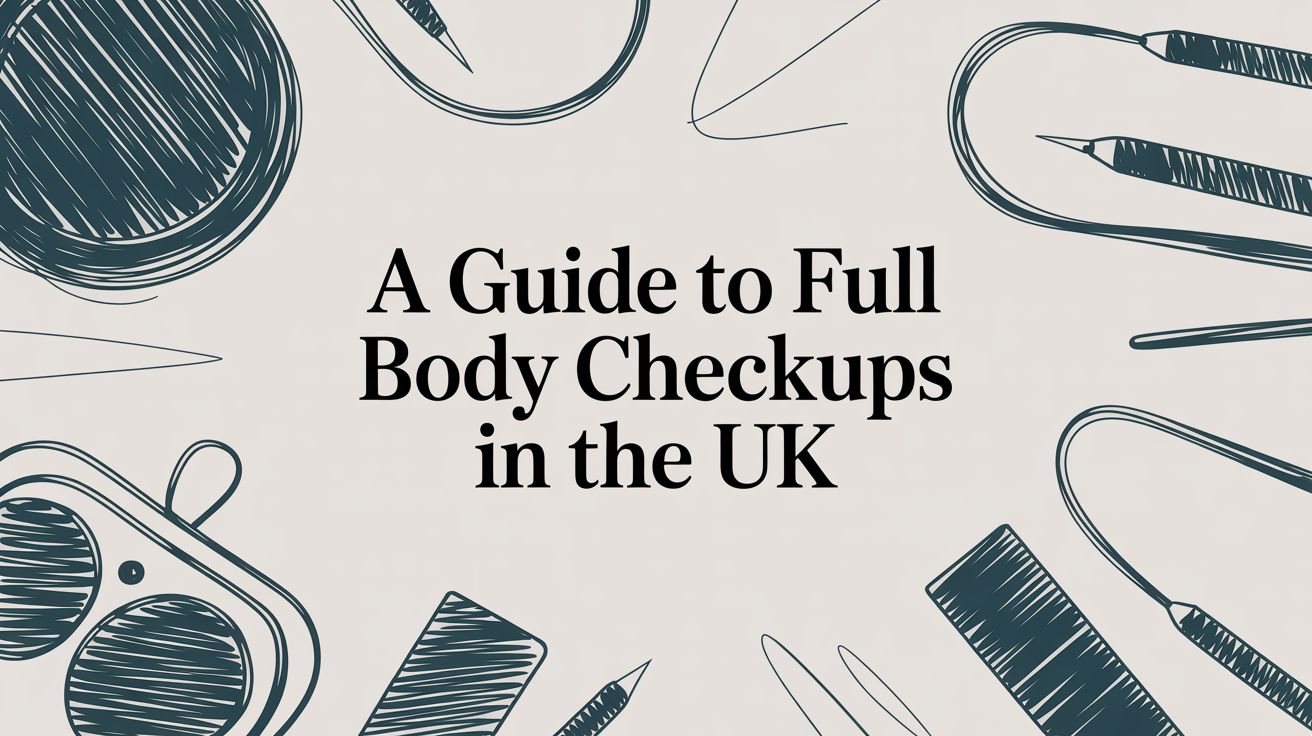.webp)
A full body checkup is essentially a deep dive into your current health, using a series of medical tests and physical exams to build a comprehensive picture. Think of it as a proactive strategy to spot potential health risks or underlying issues long before they become serious problems.

The best way to think about a full body checkup is like a detailed MOT for your body. You wouldn't wait for your car to break down before getting it serviced, and the same logic applies to your health. This kind of screening is a powerful, proactive measure to catch potential issues early.
It’s about shifting your mindset from just reacting to symptoms to truly understanding and managing your long-term wellbeing. Instead of waiting for illness to announce itself, you’re gathering vital data on your body's performance. By looking at key health markers, you get a clear, evidence-based snapshot of what’s happening on the inside—something you can’t get from just how you feel day-to-day.
A typical full body checkup in the UK is designed to give you a 360-degree view of your health. It’s not just one test but a combination of key components that come together to create a detailed, personal health report.
This blend of tests and discussion gives the results crucial context, connecting the dots between your lifestyle choices and your biological data. It’s far more comprehensive than a simple screening that might only look for one or two specific risks.
A full body checkup is an investment in your future health. It provides the knowledge needed to make informed decisions, whether that means making a few lifestyle tweaks or seeking further medical advice.
It’s really important to distinguish between a screening checkup and a diagnostic assessment. A full body checkup is a screening tool, designed for people who are generally healthy. Its whole purpose is to identify early risk factors or the silent signs of disease.
If that screening flags an area for concern, then further diagnostic tests would be the next step. For example, if a high cholesterol reading pops up during your checkup, your doctor might recommend more specialised cardiac investigations.
A general health check up provides the foundational data you need to steer your health journey in the right direction. Once you understand your baseline, you and your doctor can build a personalised plan to keep you well for years to come.

A full body checkup can feel a bit like getting a complex report card without knowing the subjects. The real value isn’t just in the results, but in understanding what each test is actually looking for and how it contributes to your personal health story.
So, instead of getting lost in medical jargon, let’s break down the key tests you’ll likely encounter. Think of them as different chapters in the book of your health—each one reveals a unique part of the narrative, and together, they create the full picture.
This is the foundational check on your cardiovascular system, the engine that powers your entire body. These tests give us immediate insights into your heart’s current performance and flag any long-term risk factors for common conditions like heart disease and stroke.
The first and most basic measurement is your blood pressure. This simple reading offers a huge amount of information about the force of blood against your artery walls. A crucial part of any checkup is knowing how to interpret blood pressure readings correctly, as consistently high numbers can signal potential strain on your heart.
Other key tests for heart health often include:
Your liver and kidneys work silently in the background, performing essential detoxification and filtration jobs around the clock. Specific blood tests are designed to check whether these crucial systems are running as they should.
The results from these tests act as performance indicators for your internal machinery. For instance, a Liver Function Test (LFT) measures enzymes and proteins made by your liver. If levels are elevated, it might suggest inflammation or damage, prompting a closer look at lifestyle factors like diet or alcohol intake.
Similarly, a Kidney Function Test analyses substances like creatinine in your blood to see how well your kidneys are filtering out waste products. Catching any decline in function early is key to preventing long-term kidney issues.
Your body is a complex, interconnected system. Organ function tests provide an essential glimpse 'under the bonnet,' ensuring the hidden machinery that keeps you healthy is in good working order.
This group of tests zeroes in on your metabolism—the process of turning food into energy—and the hormones that regulate it. Imbalances here can lead to widespread health issues, from type 2 diabetes to chronic fatigue.
A central test in this category is the HbA1c, which gives us a snapshot of your average blood sugar levels over the past three months. It’s an incredibly useful tool for assessing your diabetes risk because, unlike a single glucose reading, it provides a long-term view of how your body is managing sugar.
Other important metabolic tests include:
Understanding what your bloodwork reveals is fundamental to preventive health. To dive deeper into this, you can learn more about how blood testing is an unsung hero of preventive healthcare in our detailed guide.
To help you connect the dots during your next checkup, the table below summarises some common tests and what they’re designed to uncover.
Test CategorySpecific TestPurpose of the TestHeart HealthLipid ProfileMeasures cholesterol and triglycerides to assess cardiovascular risk.Heart HealthECGRecords heart's electrical signals to check for rhythm abnormalities.Organ FunctionLiver Function Tests (LFTs)Assesses liver health by measuring key enzymes and proteins.Organ FunctionKidney Function TestsMeasures waste products to evaluate how well kidneys are filtering blood.Metabolic HealthHbA1c (Glycated Haemoglobin)Provides a 3-month average of blood sugar levels to screen for diabetes.Metabolic HealthThyroid Stimulating Hormone (TSH)Checks thyroid gland function, which regulates metabolism and energy.General HealthComplete Blood Count (CBC)Evaluates overall blood health, detecting anaemia, infection, or inflammation.
Each test provides a piece of the puzzle, helping you and your doctor build a clear and actionable plan for your long-term health.
It's clear there's a big shift in how we think about our health. We’re no longer just waiting for something to go wrong before we see a doctor. Instead, people are getting proactive, treating a full body checkup as a vital part of staying well for the long haul—a bit like getting your car serviced before it breaks down on the motorway.
This isn't just a hunch; it's a real trend. We're moving away from reactive healthcare, where we only treat symptoms, and embracing a preventive approach. It’s all about getting ahead of the curve, understanding what’s happening inside our bodies to catch issues early, manage risks, and feel our best.
So, what’s behind this growing interest in preventive checks? A major factor is our increased awareness of chronic diseases. Conditions like heart disease, type 2 diabetes, and some cancers can develop silently for years without any obvious signs.
We now understand just how much our lifestyle and genetics influence these conditions. A full body checkup gives you the data to see exactly where you stand, creating a personal roadmap to make smart changes before a potential risk turns into a serious problem. It’s this sense of empowerment that’s encouraging more of us to take control.
Another key driver is the changing attitude in the workplace. Smart companies now realise that a healthy team is a productive team. Many are rolling out corporate wellness programmes that include private health screenings, making preventive care far more accessible and normalising the idea of regular health checks.
You can see this shift reflected in the numbers. The demand for private health screenings has created a huge market in the UK, fuelled by people who want a deeper understanding of their health.
The UK health check-up market is now estimated to be worth between £1.54 billion and £1.67 billion, and it's expected to keep growing. This is partly due to the rise in chronic conditions—nearly half of all UK adults report having a long-standing health issue—and the boom in digital health tools. Public interest is soaring, with online searches for 'private health check' in the UK jumping by almost 60% between 2019/20 and 2021/22 alone. You can learn more about the trends in workplace health checks and see how this market is evolving.
"Investing in a full body checkup is an act of foresight. It's about trading uncertainty for information, allowing you to make proactive decisions today that will profoundly impact your quality of life tomorrow."
Ultimately, the rise of preventive health checks is about wanting knowledge and control. In an era where we can track everything from our finances to our fitness, it only makes sense that we'd want the same clarity about what's going on inside our bodies.
A full body checkup does exactly that. It takes complex biological data and turns it into clear, actionable insights, helping you understand your personal risk profile and what you can do to protect your future. This isn't just a fleeting trend; it's a fundamental change in how we value our wellbeing, putting our health firmly back in our own hands.
When you’re thinking about a health checkup in the UK, you have two main routes: the free NHS Health Check and the more comprehensive options offered by private clinics. Knowing the difference between them is the key to figuring out which one is right for your health goals.
The NHS Health Check is a fantastic public health initiative. It's specifically designed to spot the early warning signs of major cardiovascular conditions like heart disease, stroke, diabetes, and kidney disease. It's a targeted programme, not a general full body checkup.
This means it’s only offered to a specific group. You need to be between 40 and 74, live in England, and not already have a diagnosis for one of the conditions it screens for. Its focus is narrow but vital—it's all about catching the biggest public health risks early on.
An NHS check involves a series of straightforward tests and questions. Your appointment will likely include:
From these results, you'll get a score estimating your risk of developing a cardiovascular problem over the next decade. While incredibly valuable for public health, it doesn’t give you the deep, all-round overview many people want from a full body checkup.
Private screenings work on a completely different principle. They are open to any adult, no matter your age or medical history, and offer a much broader range of tests. This gives you a far more detailed and personalised look at your overall health, going way beyond just cardiovascular risk.
With a private checkup, you can investigate everything from vitamin deficiencies and thyroid function to detailed organ health and cancer markers. This wider scope is designed to give you the complete picture, picking up on subtle imbalances or potential issues that a more focused screening might miss. To get a better feel for how private medical services are structured, take a look at our guide on what private healthcare is and how it works.
The infographic below shows why more and more people are getting interested in proactive health management—it's a mix of rising awareness, better access to services, and the need to manage long-term health conditions.

This really highlights the shift towards people wanting more control and deeper insights into their health, which is exactly what private screenings are set up to deliver.
So, how do you choose? Often, it comes down to accessibility, cost, and just how much detail you’re looking for. While the NHS programme is free, it has faced real challenges with getting people through the door.
Recent figures showed that in one quarter, only 6.3% of eligible people were even offered a check, and just 2.1% actually had one. With a take-up rate of only 33% among those who were invited, it's clear that many people who could benefit aren't accessing the service.
Private screenings fill this gap. They offer immediate access and a much deeper analysis for anyone who wants a thorough investigation into their health without waiting for an invitation or being restricted by eligibility criteria.
To make it even clearer, here's a side-by-side comparison to help you weigh up your options.
FeatureNHS Health CheckPrivate Full Body CheckupEligibilityAges 40-74, by invitation only, no prior diagnosis of key conditions.Open to all adults, regardless of age or health history.CostFree at the point of service.Varies by provider and package, paid for privately or via insurance.Scope of TestsFocused on cardiovascular risk (blood pressure, cholesterol, BMI).Extensive range of tests covering organ function, metabolic health, vitamins, and more.AccessibilityDependent on invitation from GP; uptake can be low.Can be booked directly at your convenience, with minimal waiting times.Follow-upAdvice on lifestyle changes and potential referral within the NHS.Detailed report, personal consultation, and clear plan for next steps.
Ultimately, the best choice is a personal one. The NHS Health Check provides an essential safety net for spotting cardiovascular risk. A private full body checkup, on the other hand, offers a proactive, detailed, and completely personalised approach to managing your overall wellbeing.

Getting the most from your full body checkup actually starts before you even arrive at the clinic. A little bit of prep work goes a long way, ensuring your test results are accurate and your conversation with the doctor is as productive as possible. Think of it like doing your homework before a big meeting—it helps you walk away with clear, actionable advice.
One of the most common instructions you'll receive is to fast. This is non-negotiable for certain blood tests, particularly those looking at your glucose and cholesterol levels.
Eating or drinking anything other than water can throw these numbers off, giving a skewed picture of your metabolic health. The standard advice is to avoid all food and drink (except water) for 8 to 12 hours before your blood is drawn.
On the day of your checkup, a few simple choices can make everything run much more smoothly. It’s the small details that often make the biggest difference.
Nailing these practical steps means the logistical side of your appointment is sorted, letting you focus on the important bit: the discussion about your health.
Your checkup is a two-way conversation, not just a series of tests. Preparing your thoughts and questions beforehand transforms it from a passive screening into a collaborative session focused on your personal health goals.
The real value of a checkup often comes from the chat you have with your doctor after the tests are done. To make this time count, it’s worth doing a little mental prep.
Before you leave home, take a moment to think about how you've been feeling. Jot down any symptoms, niggling concerns, or questions you have, no matter how minor they seem. Have you noticed any changes in your energy levels, sleep, or digestion? Is there a family history of a particular condition that’s on your mind?
Bringing a list ensures you don’t forget anything important in the moment. This kind of active participation turns your appointment into a powerful opportunity to get clarity and create a proper plan for your wellbeing. For more on what to expect, especially as a new patient, you might find this guide on a well person check helpful.
Let's talk about one of the most practical questions when considering a private full body checkup: how much does it cost? Investing in your health is priceless, but you need to know the financial side of things to find a screening that fits your budget and what you’re hoping to achieve.
Prices for health checks in the UK can vary wildly, so it helps to understand what drives that final figure.
Think of it like getting your car serviced. A basic oil change is always going to be cheaper than a full diagnostic that checks every single component from top to bottom. It’s the same with health screenings. An entry-level checkup will be more affordable than a comprehensive executive package that includes advanced imaging or specialist consultations.
Several factors come together to determine the price of a private health check. The biggest driver, without a doubt, is the number and complexity of the tests involved. A basic MOT covering your vitals and essential bloodwork will naturally cost less than one with extensive hormonal panels, cardiac stress tests, or genetic markers.
Other key factors that influence the price include:
To get a clear idea of what to expect, it’s always a good idea to look at a detailed price list for various health checks. That way, you can see exactly how different packages are put together.
A full body checkup isn't just a one-off payment for a set of tests; it's an investment in clear, actionable health intelligence that can guide your wellbeing for years to come.
It's also worth mentioning the rise of workplace wellness schemes. More and more companies are now offering subsidised or even fully funded health checks as an employee benefit, which is making proactive health management much more accessible. This is all part of a bigger shift towards preventive care in the UK.
The UK’s health check-up market is projected to hit USD 3.19–3.51 billion by the early 2030s, which shows just how much people want to take control of their own health. Workplace checks are a huge part of this, with packages ranging from essential screenings at around £95 per employee to more in-depth executive options at £250. This growth really highlights the value that both individuals and businesses are placing on staying ahead of health issues.
Even with all the benefits laid out, it's completely normal to have a few practical questions before committing to a full body checkup. Getting these queries cleared up can make all the difference, helping you walk into your appointment feeling confident and ready to get the most out of it.
Let's tackle some of the things we get asked most often.
There’s no single, "one-size-fits-all" answer here. The right frequency really comes down to you—your age, your personal health history, and any known risk factors, like a family history of heart disease.
As a general rule of thumb:
Your doctor is the best person to advise on this. After your first screening, they can create a personalised schedule that makes sense for your health profile.
First, don't panic. An abnormal result isn’t a diagnosis—it’s just a signpost. It’s a flag that tells you and your doctor, "Okay, let's look a little closer at this." This is exactly why proactive screening is so powerful; it gives you a heads-up.
If something is flagged, your doctor will sit down with you to explain what it means in the context of your overall health. They’ll then map out the next steps, which could be anything from a simple lifestyle change and a follow-up test to a referral for a more specialised investigation. The goal is always early, informed action.
An abnormal test result is the starting point of a conversation, not the conclusion of your health story. It empowers you to take specific, targeted steps to protect your wellbeing.

At The Vesey, we believe proactive health management is the foundation of a long and healthy life. Our range of comprehensive health screenings is designed to provide you with the clarity and insights you need to take control of your wellbeing. Explore our health checkup packages today.
A full body checkup can sometimes pick up on markers or abnormalities that might be linked to certain cancers, like a high PSA level for prostate health or unusual blood cell counts.
However, and this is important, a general health screening is not a replacement for dedicated cancer screening programmes. It doesn't take the place of mammograms, colonoscopies, or smear tests.
If you have a specific worry about cancer because of your family history or symptoms you're experiencing, you need to bring this up with your doctor directly. They will recommend the most appropriate tests for your situation. When looking into what a checkup covers, it's common for people to have similar questions about insurance, such as whether Medicare covers yearly physicals.
At The Vesey, we believe proactive health management is the foundation of a long and healthy life. Our range of comprehensive health screenings is designed to provide you with the clarity and insights you need to take control of your wellbeing. Explore our health checkup packages today.
